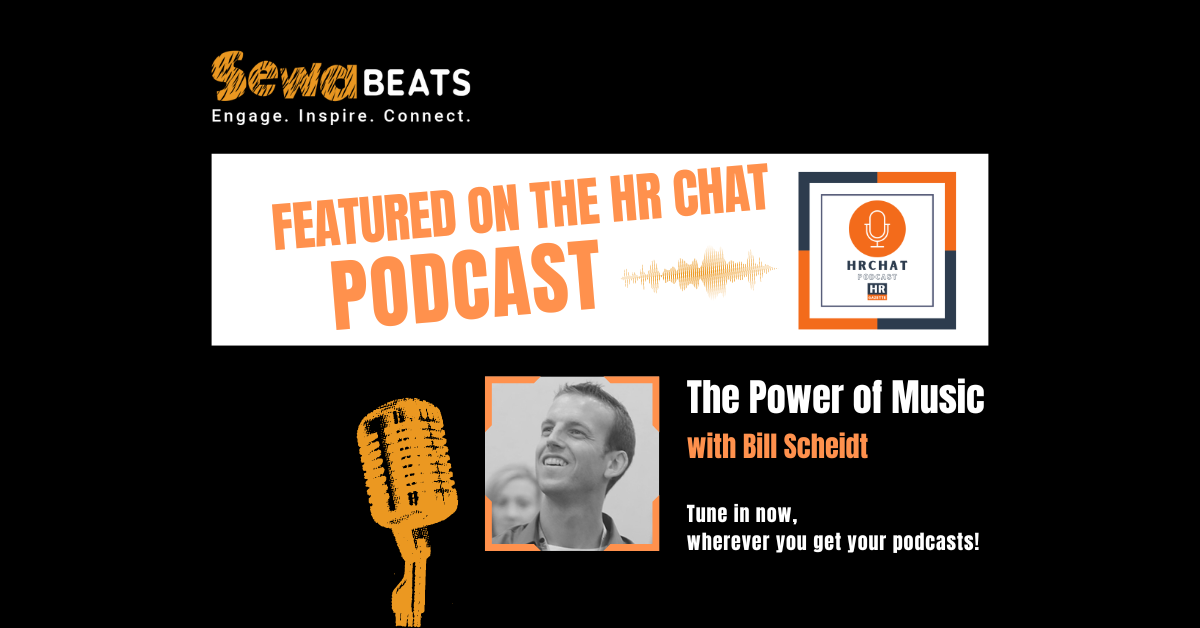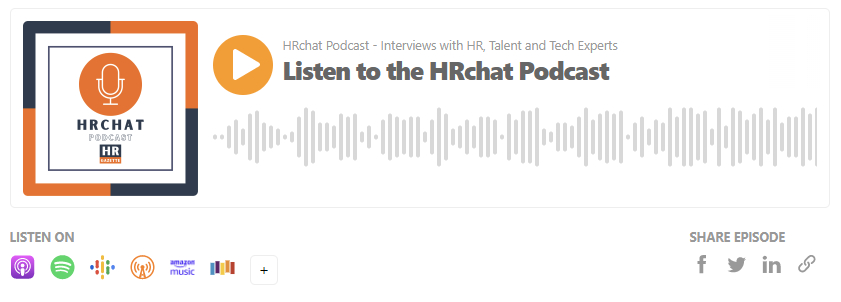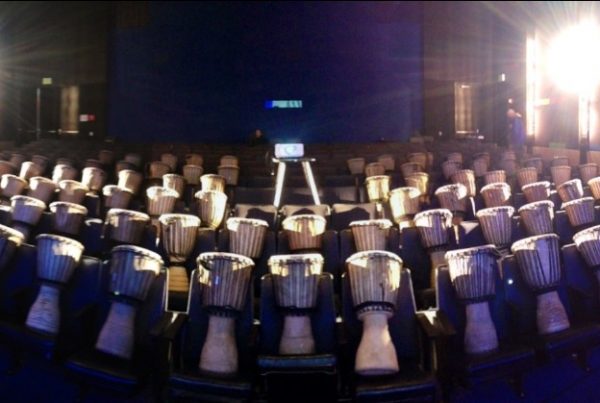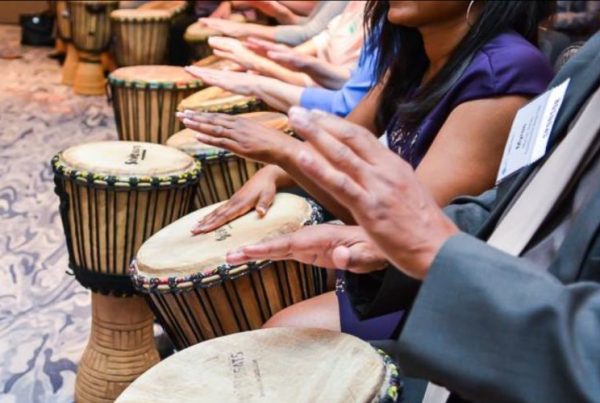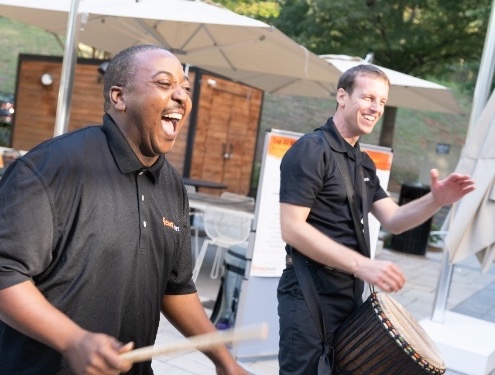The HR Chat Show is HR Gazette’s popular podcast designed for HR pros, talent execs, tech enthusiasts, and business leaders. In their recent episode, they featured our very own Bill Scheidt to unlock the secrets of professional success through the transformative power of music.
Bill shares his life-changing experiences in Africa and how they inspired a unique approach to corporate training. Discover how music serves as a powerful metaphor for essential business skills like communication, leadership, and teamwork. Learn how experiential learning, enhanced by the principles of music, can significantly boost employee engagement and performance in leadership, diversity, equity, inclusion (DEI), and change management.
We also explore the scientific benefits of integrating music into leadership development programs, especially amid the challenges of the pandemic. From improved cognitive abilities to stress reduction, the impact of music on brain function is profound. Bill emphasizes the power of intention and its critical role in achieving personal and professional goals. Through the lens of music, we examine how setting clear intentions and valuing diverse contributions can foster a culture of inclusion and engagement. Tune in to understand the tangible benefits of experiential learning and DEI initiatives in organizational settings.
Questions for Bill include:
- Why is music as a metaphor for professional success?
- How does music connect to DEI?
- How does experiential learning connect with music?
- Sewa Beats’ clients include organizations such as BMW, Pfizer, Wells Fargo, Hewlett Packard, and the Harvard Business School. Can you share some use cases you’re particularly proud of?
- Why is the ATD Conference an important event in the L&D and HR calendar?
- Any sessions at ATD that stuck out for you?
- What is the secret to setting clear intentions and how can it help accomplish one’s goals?
Transcript
Speaker 1: 0:03
Welcome to the HR Chat Show, one of the world’s most downloaded and shared podcasts designed for HR pros, talent execs, tech enthusiasts and business leaders. For hundreds more episodes and what’s new in the world of work, subscribe to the show, follow us on social media and visit hrgazettecom. And visit hrgazettecom.
Speaker 2: 0:26
Welcome to another episode of the HR Chat Show. Hello listeners, this is your host today, Bill Bannam, and in this episode we’re going to consider music as a metaphor for success. And my guest today has a really cool name. That’s because he’s called Bill. He’s called Bill Scheidt, managing partner and maestro over at Sewa Beats.
Speaker 2: 0:46
Before becoming the managing partner of Sewa Beats, Bill spent a year and a half living, working and studying music in Africa. One of his first trips to Africa was as the leader of an ecology research project, where he designed a study around a population of giraffes in a national park. That sounds pretty awesome. It was then that he first fell in love with Africa, its music and its people. Regularly returning to study music, Bill learned Swahili Blimey, I didn’t know that. Bill that’s impressive Volunteered to teach English in a rural school and worked on local community outreach initiatives. He later went on to become an instructor at the world’s first internationally recognized academy of west african drumming, with the help of Bill’s leadership, say, where beats has delivered corporate programs in around 20 countries, seven languages and reached more than 300000 participants around the world. Not too shabby, saber. Sewa Beats clients include organizations such as BMW, Pfizer, Wells Fargo, Hewlett-Packard and the Harvard Business School. Bill you, superstar. Welcome to the show today.
Speaker 3: 1:58
Thanks, Bill. Thanks for having me. It’s really a pleasure to be here.
Speaker 2: 2:02
What a great name. Don’t go by William, you go by good old Bill. So good old Bill, why don’t you start by, beyond my introduction there, why don’t you start by taking a minute or two and telling our listeners a bit more about yourself, your career background, before we’ll then get into the mission of the company?
Speaker 3: 2:20
Yeah, thanks. Well, that was a fantastic introduction you gave me, I think. To add on to that, I can just add a little bit about my personal mission and why I do the work that I do. Going to Africa was an experience that completely changed my life and I was just so touched by the heart and the community and the family values and the way people work together in villages, and the way people work together in villages and the music of West Africa was particularly an inspiration and an expression of the heart and the values of the people and the culture there. So for me, I do the work that I do because it is a way of paying forward what a blessing that experience was, and it’s also a really fascinating way of bringing experiential learning into the HR world.
Speaker 4: 3:11
Thanks for listening to this episode of the HR Chat Podcast. If you enjoy the audio content we produce, you’ll love our articles on the HR Gazette. Learn more at HRGazettecom. And now back to the show at HRGazettecom. And now back to the show.
Speaker 2: 3:27
Okay, thank you very much. Let’s get into the mission of Say we’re Beats. Then Can you give us your boilerplate. In fact, let’s challenge you, because we’ll get into the details later, but let’s challenge you straight off the bat. I like to do this with my guests, sometimes in 60 seconds or less. Give us the mission, and why? Say we’re Beats is an awesome organization. Go.
Speaker 3: 3:52
I love the challenge. Thank you Well, to sum it up, I would say that most HR professionals are on a mission to help people learn, grow and succeed. I think that’s why most HR professionals do what they do. I think a lot of HR professionals worry, though, about how to break through and get the attention of the people that they’re interacting with the people in their teams. So I think figuring out how to connect with employees and how to have a real impact is perplexing and can be a challenge. I mean, who wants to risk an initiative that falls flat? So we offer a different modality that connects message, people and performance. So we use the modality of music we are not another talking head or another PowerPoint and, using music as a metaphor and through experiential learning, we deliver training and programming in areas like leadership, dei, change management and teamwork.
Speaker 2: 4:54
OK, I’d say that was around about a minute. So good work there, good work, ok. So at the at the top of this episode today, I said that we are going to consider music as a metaphor for success. So next question for you is why? Why, in your opinion, is music a metaphor for professional success?
Speaker 3: 5:15
Yeah, that’s a great question, Thank you, and music as a metaphor for professional success is really the underpinning of what we do.
Speaker 3: 5:22
That is the main idea of our programs and, if you think about it, many of the skills that make us successful in the world of music are often the same skills that make us successful as professionals in the business world.
Speaker 3: 5:40
So to be a successful musician, so to be a successful musician, to be a successful professional, we have to be experts at skills like communication, like listening, like collaboration, like adapting to change, like leadership, like followership, many of the skills that that we use every day in a business setting. Those same skills, those same principles, those are the same skills that make use every day in a business setting. Those same skills, those same principles, those are the same skills that make us successful in music and vice versa. So we give people an opportunity to see those skills and see how they show up as professionals through a new lens, through the lens of music. Sometimes we like to say we’re not going to teach you anything you don’t already know, but we’re going to give you the opportunity to see what you already know through a unique perspective, or see how you show up your skillset, your strengths in a new environment, and of course that is the musical environment. That is the musical environment.
Speaker 5: 6:45
Once in a while, an event series is born that shakes things up, it makes you think differently and it leaves you inspired. That event is Disrupt HR. The format is 14 speakers, 5 minutes each and slides rotate every 15 seconds. If you’re an HR professional, a CEO, a technologist or a community leader and you’ve got something to say about talent, culture or technology, disrupt is the place. It’s coming soon to a city near you.
Speaker 2: 7:16
Learn more at disrupthrco. Okay, okay, thank you very much. So SaberBeats clients include some pretty impressive brands BMW, wells Fargo, harvard Business School, just to name a few there. Would you like to take a couple of minutes and shout about how amazing you guys are by sharing a couple of use cases that you’re particularly proud of?
Speaker 3: 7:42
Yeah, yeah, sure, absolutely. I think one use case that I’m particularly proud of is the work that we’ve been doing with a very large pharmaceutical company. If I said their name, everybody on this podcast would know exactly who I was talking about. They first came to us during the pandemic and they were doing a leadership development program for people of color specifically, and it was an international group. It was a training that went across a period of time and they brought us in as a capstone.
Speaker 3: 8:14
So they said, hey, these are the learning objectives we’ve been training our leaders on, and we would like you to design an experiential program that summarizes all of these learning objectives and gives the participants a chance to experience these learning objectives in real time, in real life, summarize and really finish this whole leadership development journey on a high note in a way that’s going to be impactful and helps people take away these learnings and apply them when they’re actually on the job.
Speaker 3: 8:54
And we ended up running a series of those virtually. They were so successful they continued to invite us back for future cohorts and then many of the leaders from that leadership development program have gone on to have very successful careers in that company, in their own business units and then have brought us into work with their specific teams at their global headquarters at other locations around the world, both live and virtually. So I think that was a great example of being adaptive, first of all, to figure out how to do experiential learning through music via Zoom in the pandemic, and then I think it’s also a great example of how music is really impactful and it can help drive learning in a way that is unforgettable, in a way that people remember and in a way that they’re inspired to take back to their teammates and share.
Speaker 2: 9:49
Is there any clever science-y stuff that you can add to that answer? You know, for example, does music do special things to our gray matter to inspire us and make us perform better? What’s the science behind using music to stimulate higher performance?
Speaker 3: 10:08
Yeah, that’s a great question. So there’s really two main areas there. So brain structure and brain function. There’s a lot of research out there that shows that musicians have larger and more developedosum, and that is the area that connects the left and right hemispheres of the brain, and that structural change facilitates communication between the two hemispheres and improves overall cognitive function. And then, speaking of function, there’s some research out there, of course, that says listening to music can activate the release of dopamine, right, that’s the neurotransmitter associated with pleasure and reward, and that can improve mood, increase motivation and reduce stress.
Speaker 3: 11:02
Of course motivation and dealing with stress are big in the business world today. And then, of course, playing music so we were just talking about listening to music. But playing music can improve cognitive abilities such as memory, attention, focus and language processing. In fact, one study found that children, especially who received music training, had higher scores on verbal memory tests than those who did not receive training. Not receive training. And there’s some research brewing out there that is translating also some of those same learnings to the world of adult learning.
Speaker 5: 11:40
Fidelio Inc is a consulting firm specializing in improving human performance and we’re proud to support the HR Chat podcast. We help identify strategic competencies and behaviors that drive results. We help identify strategic competencies and behaviors that drive results. Our team offers an HR web software to manage systems, reports and data for HR people that need the best insights to make the right decisions and achieve better results.
Speaker 2: 12:07
Learn more at Fidelocom. Okay, so, Bill, as we record this particular interview, I’ve just finished a bit of a whirlwind tour of a bunch of big conferences in the US and in the UK. Before I take a bit of a hiatus as I’m going on paternity, leave you and I first met at one of the amazing conferences that I got to go back to again this year. We met last year at the ATD conference, which I believe last year was in San Diego. I managed to get a ball game in what an amazing stadium. And then we we called up again this year in New Orleans in May. Why is ATD an awesome event and why is it a good fit for you guys?
Speaker 3: 12:49
A great question. By the way, congratulations again on your paternity leave. I know that’s very exciting, yeah. So why is ATD such a great event? For me, I love ATD because of the international presence of so many folks from HR and talent development, so many different organizations. It’s such an opportunity to learn from each other, to connect with each other, to get ideas, to stay current on what’s going on. The people that you meet there are just fantastic Case in point, right. You and I probably would have never met unless we were both at ATD. So I think the opportunity to engage and connect is just really inspiring.
Speaker 2: 13:34
Okay, so you were there for a few days. I’m sure you got to see a couple of sessions outside of being on the exhibitor stand there. What sessions stood out for you and why?
Speaker 3: 13:47
Great question. So I really enjoyed the session that was put on by Sardique Love. He spoke on engagement and I think engagement is very it’s critical in this day and age. We have to engage the people that we’re working with, and what I really appreciated about his presentation was not only was it focused on engagement, but it was very practical and very down to earth and it tied a lot into experiential learning, and, of course, experiential learning is what we do, and we had the opportunity to do a presentation there as well, which was just super fun and super exciting for us.
Speaker 2: 14:30
So the ideas, the cross-pollination there, I thought was just fascinating and really interesting now then, as part of my homework ahead of today’s chit chat, uh, I was all over your website and uh, looking through your blog. Lots of awesome content in there, so well done to you. In one of the blog posts, which was called the power of intention in achieving goals, which was written earlier in 2024, you discussed how setting clear intentions can be a game changer in accomplishing one’s goals. Can you tell us a bit more about that?
Speaker 3: 15:11
yeah, yeah, absolutely. You know, I think we we grow up in a culture that says you know, hard work, dedication, planning those are crucial for achieving our goals. And I think we should also not underestimate the context of goal achievement. For me, I refer to that as the mental state of committing to a specific outcome or objective, so that’s beyond just a vague desire. Yeah, I think I want to do this. I think I want to do that. It’s a conscious decision and a deliberate focus on what we want to achieve, and there’s a lot of research in psychology that has explored the effectiveness of the power of intention.
Speaker 3: 15:56
Studies have shown that setting specific, challenging and achievable goals with a clear intention increases our motivation and performance.
Speaker 3: 16:06
I think there’s also some very powerful connections with visualization, so mentally picturing ourselves successfully achieving our goals and this is also for me as a performing musician.
Speaker 3: 16:20
Visualization is something that I actually used quite a lot, and I think there are also some pretty practical tips that we can all avail ourselves for training the power of intention. Experiential learning, for example, is a very potent way to develop the power of intention, and the experience of learning to play music is a powerful context for that. So experiential learning that gives us the opportunity to practice setting an intention and then participate in the process of actually achieving that intention. So, as a metaphor, learning to play music is a particularly effective tool, because when we’re learning to play music, we get immediate and direct feedback as to our degree of success in manifesting our intended outcome. So in the world of music, the intended outcome may be to play this piece or to play this passage. Of course, in our business lives it may be to accomplish a specific goal or a specific intention, but I think that the power of intention is a very powerful force and it’s supported by a lot of scientific research.
Speaker 2: 17:28
And just going back to the ATD piece for a moment, I’m guessing you’re pretty unique there as an exhibitor, right? I’m guessing there weren’t many other organizations out there that are espousing what you guys are talking about.
Speaker 3: 17:39
what we’re discussing today Is that fair to say, and they say, wow, what is this? It immediately grabs people’s attention because, yeah, there are not very many other people out there in the world doing what we do, and that’s also, I think, one of the things that makes our program so engaging is when a group of employees walks into a room and they see a room full of drums that are there for them to play. That is quite a unique and outside-the-box experience for a lot of people.
Speaker 2: 18:13
Yeah, I mean, I saw the drums last year and I had to stop. It took me back to many, many years ago when I was a young man before I had gray hair where I worked in a store, uh, in a little village on the North Norfolk coast in England where, um, uh, the the boss of the the shop. He used to regularly go over to Bali and buy lots of drums and bamboo didgeridoos and various things. In fact, my secret superpower is I can play the didgeridoo. So it brought back lots of happy memories for me. So the next couple of questions I want to ask of you, Bill, are actually questions that I asked you to suggest to me. I said, Bill, shoot over a couple of questions or a couple of topics that you’d be interested in making sure that we cover. So I want to make sure we cover those now. The next question, therefore, is how does music connect to DEI? Tell us more.
Speaker 3: 18:58
Yeah, that’s fantastic. I really love the topic of DEI and I find that music is such a powerful metaphor for diversity, equity and inclusion. You know everything, from the way that we value the unique voice of each instrument to the way that we try to balance sound when we’re when we’re working on a microphone mix. There are a lot of lessons from music that connect to what does it mean to create a culture that values DEI? I think, for example, let’s just start with diversity. So does every instrument in an ensemble look the same or sound the same? No, does every instrument play the same part at the same time? No, so we don’t pretend that every instrument is the same. In fact, we recognize each instrument is different and we value those differences, because it’s exactly those differences that make the music sound rich and textured, and in the same way that it’s the diversity amongst instruments that makes for a great musical performance.
Speaker 3: 19:57
There’s a lot of research out there economic geography, a bunch of other publications that have found that companies with diverse leadership are more likely to come up with innovative products than those lacking in diversity. There’s another study I read recently that companies with one or more female board members produced higher return on equity and net income growth than those with all male boards. I think another great example is inclusion. So in the musical world, is the spotlight continually shining on just one instrument and if so, does that make for an interesting and engaging ensemble? Or does it sound better when we try to create an environment in which each instrument has the opportunity to make its unique and individual contribution in a way that it’s heard, recognized and valued?
Speaker 3: 20:48
And in our organization, or in organizations in general, that connects to the idea of creating a culture in which employees are heard, recognized and valued for the unique strengths and perspectives that they bring to the table. And of course, we know that inclusion generates engagement and engagement generates results. There was a study done by an author results. There was a study done by an author, Hajab Azam, and in that publication, in that research, they found that organizations with high engagement rates beat industry averages for profit margins, revenue growth and shareholder returns. So there’s a lot of research out there on the power of DEI and what I particularly love about music as a metaphor for DEI is that people get it right away because it’s a physical, tangible, direct experience.
Speaker 2: 21:39
So we’re not learning about dei, but we’re having an experience of dei quite a nice lead into the next question, um, although I feel like, in a way, maybe because of the discussion we had a little while ago around the different parts of the cerebellum and, and uh, the impact of music on gray matter, we may have tackled this a little bit. Therefore, I’m going to challenge you to answer this next one in 60 seconds or less. Here we go. Uh, how does, how does Bill experiential learning connect with music?
Speaker 3: 22:08
yeah, that’s great thanks, and I love your 60 second challenges. So there’s a very well-known cognitive scientist named David Kolb, and he wrote one of the most influential books in the field of experiential learning, and his model for experiential learning has four elements. So element number one is concrete experience, so we experience the process of learning to play music together. One is concrete experience, so we experience the process of learning to play music together. Step two is reflective observation, so we ask ourselves hey, what worked, what didn’t, what professional skills made a difference for us in learning to play that music, leadership, communication, collaboration, et cetera. Step three is abstract conceptualization. So then we make connections between what we learned during the collective music making experience and what we do every day on the job as professionals.
Speaker 3: 22:56
And then step four in Kolb’s model is active experimentation, and that’s where we apply these learnings to successfully complete the piece of music that we’re working on. And then we apply those same learnings in our professional lives to successfully produce the results that we’re aiming for. So one of Kolb’s main tenets is that for knowledge to be serviceable, it has to be learned through experience. So if not, the knowledge is kind of isolated from experience and we’re not likely to really apply it to new situations, to new situations. So we use the musical environment to create experiences which bring forth specific learnings around topics like we’re talking about here leadership, DEI, change management and then we invite the participants to draw connections between the experiential learning through music and what they do every day on the job as professionals.
Speaker 2: 23:49
And that just takes us to my final question for you. Today should be a fairly straightforward one for you, Bill, and that is how can folks connect with you? So maybe that’s LinkedIn, maybe you might want to share your email address, perhaps you’re super cool and all over Instagram and places. And, of course, how can folks learn more about Say what Beats?
Speaker 3: 24:09
Oh yeah, thank you very much for the question, so I would say the best place to start is our website, which is SewaBeatsUSAcom. Sewa is S-E-W-A. Sewabeatsusacom. I’m also, of course, on LinkedIn under the name Bill Scheidt, and you can see a bunch of videos of Sewa Beats programs, how it works, what we do, et cetera, on our YouTube channel, which is also under the name Say what Beats.
Speaker 2: 24:34
Perfect. Well, that just leaves me to say for today Bill Scheidt, thank you very much for being my guest.
Speaker 3: 24:39
Thanks, Bill. It’s really a pleasure chatting with you. Thanks for having me today.
Speaker 2: 24:43
I should just get more guests on here, cool Bill, it’d be so easy to remember their names that way. And listeners as always. Until next time, happy working.
Speaker 1: 24:56
Thanks for listening to the HR Chat Show. If you enjoyed this episode, why not subscribe and listen to some of the hundreds of episodes published by HR Gazette and remember for what’s new in the world of work? Subscribe to the show, follow us on social media and visit HRGazettecom.

